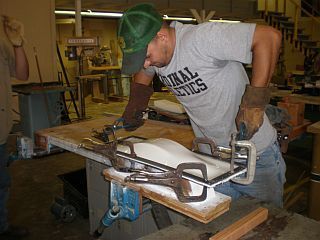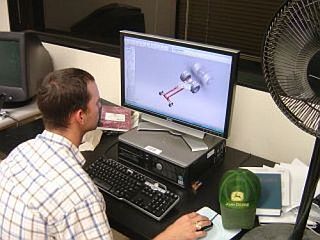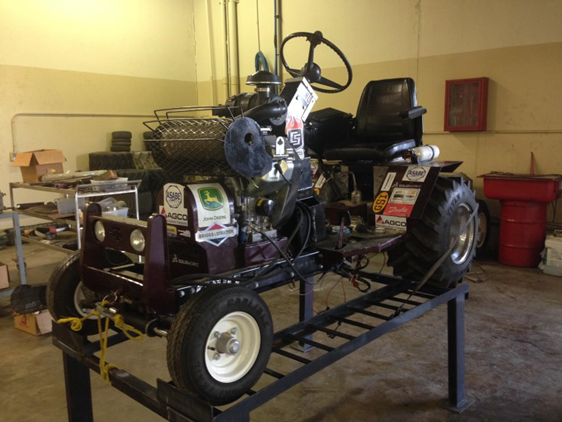
In Texas A&M University circles, it’s common knowledge that when it comes to finding a job, nothing opens doors like an Aggie Ring.
Those in the agricultural mechanics industry, however, argue that in their field, one tool is just as powerful: a résumé boasting participation on a ¼-scale tractor team.
Kevin Edwards ’14 ’16 is proof of this claim. While working on his undergraduate degree in biological and agricultural engineering, he was involved in Aggie Pullers—a student organization centered around the International ¼- Scale Tractor Student Design Competition. The annual June event was created in 1997 by the American Society of Agricultural and Biological Engineers (ASABE).
From securing an agricultural mechanics internship to becoming a product engineer for industry giant Kubota Tractors, Edwards credits his Aggie Pullers involvement and the reputation of the ASABE event.
“Participating in a ¼-scale competition is a lot of time and work, but it definitely paid off for me in the long run,” he said.

Steve Searcy, professor and head of Texas A&M’s Department of Biological and Agricultural Engineering, served as Aggie Pullers’ faculty adviser from 2006 to 2014. He recalled that at one ¼-scale competition, an agricultural equipment firm executive told him that if a job applicant had a 3.0 grade point average and had participated on a ¼-scale team, he or she would be hired.
“These companies put so much value on the learning that occurs through participation on a ¼-scale team that this experience alone is a primary motivator in the hiring of these students,” Searcy said.
Much More Than a Tractor Pull
Brad Borges ’17 joined Aggie Pullers after entering Texas A&M as a junior. Although new to the group, his prior ¼-scale competition experience at Modesto Junior College in California landed him the position of vice president. This year, he serves as president, and is eager to increase the group’s size, exposure and funding. He also wants to make clear the vast skill set involved in this endeavor.
“It’s not just a tractor pull—and that’s important to understand,” Borges said. “The ¼-scale competition involves every single aspect of what you’d see in an actual business.”
A competition brochure explains that teams are ultimately judged on their communication, teamwork and time-management skills. More specifically, they are scored by industry experts for their written design report, an oral presentation, the tractor’s design, its ability to pull weight, its durability, and its maneuverability.
Early in the year, each team is given a tractor engine and a set of tires. From there, it’s up to the students to design the mini-tractor and to secure donations for the materials and equipment needed to manufacture it.
Before the competition even begins, team members must submit a 25-page design report that describes the tractor’s every feature, from its design and manufacturability to its customer base. They must maintain a design log, noting every project-related move. Finally, they must offer a detailed cost estimate down to the penny, and must then be prepared to defend it if they go over or under that amount.
The enormity of the task involves separating the team into three groups: design, build and marketing.
“We want to run it like a company,” Borges said. “We set goals for ourselves, we establish what we want to do, and we depend on each other to meet deadlines.”
A “Little Push”
 The 2016 Aggie Pullers Team placed 18th overall out of 27 teams in the competition.
The 2016 Aggie Pullers Team placed 18th overall out of 27 teams in the competition.
"It was a fantastic learning experience for the Aggie Pullers group and it will travel back to Peoria, IL, to compete in the X-team competition in 2017. The X-team competition is designed for underclassmen to get their feet wet in the ASABE 1/4-scale competition." -Brad Borges '17, Aggie Pullers President
Texas A&M freshman Mandy Zalmanek ’20 of College Station, Texas, has spent a lifetime fascinated by the mechanics of agricultural equipment. After one semester in Aggie Pullers, Zalmanek says she’s already looking forward to taking on more team responsibility, with the ¼-scale competition in her sights.
“Being in the Corps of Cadets has taught me about leadership, and being able to apply that to Aggie Pullers is something I look forward to,” Zalmanek said. “We’ve gone to the competition year after year and have gotten really close, but need a little push to win it.”
That “little push,” she explained, is additional funding. As a member of the team’s marketing group, Zalmanek helps raise money to manufacture the tractor and to pay for team members to attend the competition.
“It’s been amazing to see how many Aggies are out there who really want to help you start or grow an organization,” she said.
Borges, too, envisions how additional funding could help Aggie Pullers finally win the competition. Over the last year, the group has grown from a handful of steady members to roughly 30. But while more members bring additional skill sets, a lack of funds means that some students are inevitably left behind when the team makes its annual trek to Peoria, Illinois.
Greater financial support would supply additional travel funds and opportunities for more students to meet industry experts in their field. It would also translate into state-of-the-art tools for tractor manufacturing and the ability to purchase needed parts.
Career Preparation
Looking back on his time in Aggie Pullers, Edwards said he was well-prepared for his “behind-the-scenes” work at Kubota.
“My experience with Pullers funneled into this career in terms of project management, having to meet deadlines, and dealing with suppliers with different experience levels,” he said. “I think having that hands-on experience of actively building the tractors and working with professionals from the industry on tractor design really helped with my success at Kubota.”
While he agrees that Aggie Pullers benefits students entering the agricultural engineering industry, Searcy stressed that the overarching lessons learned prepare students for a job in any field.
“Because the design and fabrication of their tractor requires so many different tasks, these leaders have to learn to allocate those tasks,” he said. “The students must take on a variety of roles, with the more experienced ones responsible for helping out the newer team members.
“A combination of leadership and teamwork skills are what the students really get out of this.”
You can support the Aggie Pullers with an endowed gift through the Texas A&M Foundation by contacting Jon Rigelsky ’02, director of development for the College of Agriculture & Life Sciences. You may sponsor the Aggie Pullers team by contacting Brad Borges ’17 at aggiepullers@gmail.com.